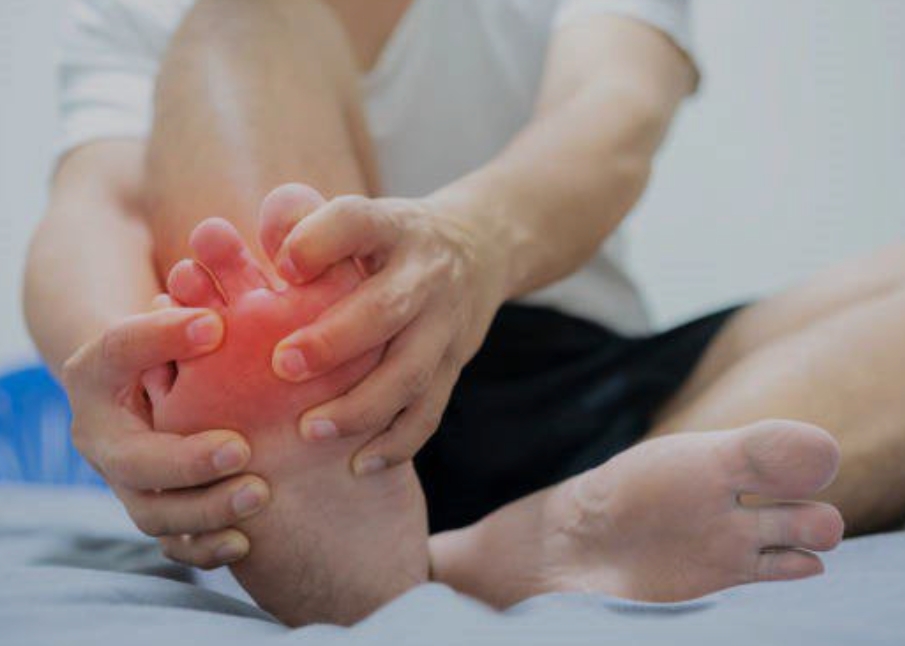النقرس هو نوع من الالتهابات التي تصيب أسفل القدم وتسبب آلامًا حادة وشديدة نتيجة تراكم مادة في الدم تُعرف بحمض اليوريك.
عند الإصابة بالنقرس، قد يشعر المريض بألم شديد أثناء المشي، مع احتمالية حدوث احمرار على الجلد أو ظهور انتفاخات وتورم في أسفل القدم.
أسباب النقرس
تناول كميات كبيرة من اللحوم والمأكولات البحرية: الأطعمة الغنية بالبيورينات تتحول إلى حمض اليوريك عند تكسيرها في الجسم.
زيادة الوزن والسمنة: الوزن الزائد يزيد إنتاج حمض اليوريك ويقلل من قدرة الكلى على التخلص منه.
استهلاك الكحول: خاصةً البيرة والمشروبات الكحولية الأخرى التي تحتوي على البيورينات.
الإصابة ببعض الأمراض: مثل ارتفاع ضغط الدم، السكري، وأمراض الكلى التي تزيد من خطر الإصابة بالنقرس.
بعض الأدوية: كمدرات البول والأسبرين بجرعات منخفضة.
العوامل الوراثية: بعض الأشخاص لديهم مستويات حمض يوريك مرتفعة بسبب الجينات.
قلة شرب الماء: يؤدي إلى زيادة تركيز حمض اليوريك في الدم ويزيد من خطر تكوين البلورات.
علاج النقرس بالتغذية
تقليل الأطعمة الغنية بالبيورينات: مثل اللحوم الحمراء، الكبدة، والسردين.
زيادة استهلاك الفواكه والخضروات: الكرز يساعد على تقليل الالتهاب ومستوى حمض اليوريك، والخيار والبروكلي يحتويان على نسبة منخفضة من البيورينات.
تجنب المشروبات السكرية: مثل المشروبات الغازية والعصائر المُحلاة.
شرب الماء بكميات كافية: يساعد في تخفيف حمض اليوريك وتعزيز التخلص منه عبر الكلى.
تقليل استهلاك الكحول: لتقليل مستوى حمض اليوريك في الدم.
زيادة استهلاك الأطعمة الغنية بفيتامين C: مثل الفراولة، الكيوي، والحمضيات.
تناول منتجات الألبان قليلة الدسم: مثل اللبن والحليب، حيث تساعد في تقليل خطر النقرس.
فقدان الوزن تدريجيًا: يساعد على تحسين الحالة العامة للمفاصل وخفض مستوى حمض اليوريك.
اختيار الحبوب الكاملة: مثل الأرز البني والشوفان للحصول على طاقة دون رفع مستوى حمض اليوريك.
أعداد فريق العمل:
ليلي محمود، مريم أحمد، مريم أيمن، سهيلة عماد، ماريا عاطف، عائشة ممدوح، مروة عبد الناصر، فتحية جميل، فاطمة محمد، شيماء رمضان.
Gout is an inflammation of the lower foot that causes sharp and severe pain due to the accumulation of a substance in the blood, which is uric acid. In the case of gout, intense pain may occur while walking, and there might be redness on the skin or swelling and puffiness in the lower foot.
Causes of Gout
1. Excessive consumption of meat and seafood: Foods high in purines, substances that convert into uric acid when broken down in the body, contribute to gout.
2. Overweight and obesity: Excess body weight increases uric acid production and reduces the kidneys’ ability to eliminate it.
3. Alcohol consumption: Beer and other alcoholic beverages contain purines and raise uric acid levels in the blood.
4. Certain medical conditions: High blood pressure, diabetes, and kidney diseases increase the risk of developing gout.
5. Certain medications: Diuretics and low-dose aspirin can raise uric acid levels.
6. Genetic factors: Some individuals naturally have high uric acid levels due to genetic predisposition.
7. Insufficient water intake: Not drinking enough water leads to higher uric acid concentration, increasing the risk of crystal formation.
Treating Gout with Nutrition
1. Limit foods high in purines: Reduce consumption of red meats, liver, and sardines.
2. Increase intake of fruits and vegetables: Foods like cherries can help reduce inflammation and lower uric acid levels. Options like cucumber and broccoli are low in purines.
3. Avoid sugary drinks: Limit consumption of sodas and sweetened fruit juices, as they can raise uric acid levels.
4. Drink sufficient water: Staying hydrated helps dilute uric acid and promotes its excretion through the kidneys.
5. Reduce alcohol consumption: Limit alcohol intake, as it can increase uric acid levels.
6. Boost Vitamin C intake: Foods rich in Vitamin C, such as strawberries, kiwis, and citrus fruits, can help lower uric acid levels.
7. Consume low-fat dairy products: Options like yogurt and milk can help reduce gout risk.
8. Lose weight gradually: Gradual weight loss can lower uric acid levels and improve joint health.
9. Choose whole grains: Foods like brown rice and oats provide energy without increasing uric acid levels.

